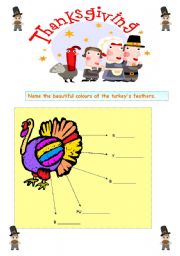
|
thanksgiving colouring
Name the turkey�s colours and then colour the turkey according to the reference. Enjoy :)
Level: elementary
Age: 5-11
Type: worksheet
Downloads: 4
|
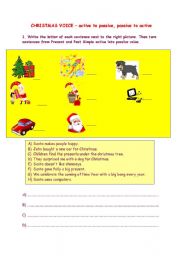
|
Passive voice
This ws has 2 pages and it includes turning active sentences into passive and vice versa. In the 1st exercise Ss have to read the given sent.first, then match them to the pictures above, and only then transform them into passive voice. All the sentences are Christmas and holiday related.
Level: elementary
Age: 12-17
Type: worksheet
Downloads: 5
|
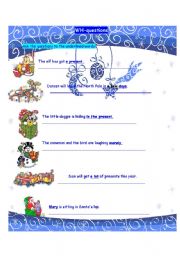
|
wh-questions
In this ws (I used it as a Stop&check activity to check Ss� knowledge after doing the wh-?lesson...the reason it is so short is that it�s easier and quicker for me to grade it ;)) Ss have to form Wh-questions for the underlined words in the sentences.
Level: elementary
Age: 11-14
Type: worksheet
Downloads: 5
|
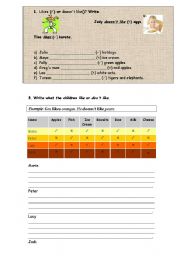
|
Do you like...? 2
This is the second page of the worksheet. Here there are two exercises - pupils have to write likes or doesn�t like according to the given info (e.g. Tom doesn�t like pizza.) In the other exercise, pupils have to write in whole sentences what the children like or don�t like.
Level: elementary
Age: 9-12
Type: worksheet
Downloads: 6
|
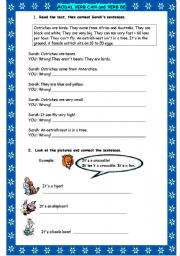
|
modal verb can and verb be
The three pages of this worksheet include practising affirmative and negative sentences with verb be - reading a text and correcting the given statements (e.g. It is a snake. Wrong! It isn�t a snake. It�s an ostrich.) Then writing what animals and people can do, transforming affirmative sentences into negative and interrogative forms. Finally, your...
Level: elementary
Age: 10-12
Type: worksheet
Downloads: 6
|
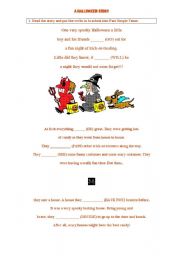
|
A halloween story
A spooooky halloween story with gaps to fill (put the given verbs into Past Simple). Then there�s an exercise on reading comprehension - true/false, and for the third exercise you can have your students write their own spooky story. Includes the key.
Level: elementary
Age: 12-17
Type: worksheet
Downloads: 29
|
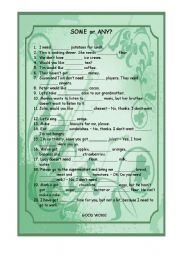
|
some or any?
Ss write some or any in the gaps. I used it for additional practice on these determiners. It�s qick to do and quick to check. Hope it�s of good use to you too.
Level: elementary
Age: 11-14
Type: worksheet
Downloads: 21
|
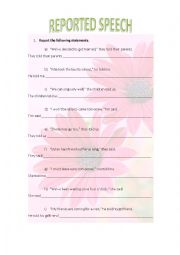
|
Reported speech
This worksheet can be used to revise converting statements and question into reported speech.
Level: intermediate
Age: 12-16
Type: worksheet
Downloads: 14
|
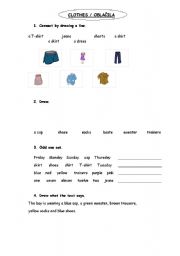
|
clothes
Worksheet with three exercises on clothes (draw a line from word to picture, odd one out, draw according to the instructions).
Level: elementary
Age: 7-10
Type: worksheet
Downloads: 1
|
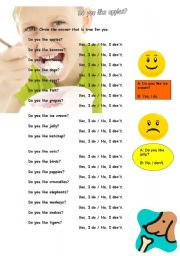
|
Do you like...?
This is the first of two pages (couldn�t send them as one, because the file is too large). In exercise one, pupils circle whether they like (or not) certain food items and animals, thus practising answers to Do you like? questions, and revising some basic vocabulary at the same time.
Level: elementary
Age: 9-12
Type: worksheet
Downloads: 14
|
|
|

Present and Past Simple active to passive voice and vice versa
Three exercises to complete: first, turn active sentences to passive, then decide whether the sent.are true or false and correct the false ones, and finally, turn some passive sentences back to active voice by choosing the appropriate verb tense among the given ones. Hope you have fun!
Level: elementary
Age: 12-100
|

family members
This is an on-line exercise which has four different exercises in it: unscrambling the letter, odd one out, reading the text and inserting the letters of a family member (the beginning is indicated with an initial letter), Who I am? - figuring out the member from the description of the relationship ...
Level: elementary
Age: 10-100
|

First Conditional
A useful on-line exercise on First Conditional with gaps in main and conditional clauses to be filled (verbs are given, but in random order!).
Level: intermediate
Age: 12-100
|

colours, numbers and toys for beginners
This exercise can help your younger learners revise their knowledge on colours, numbers, toys and answering Is it...? questions. And they can also learn that the Internet can be a helpful tool when it comes to studying :)
Level: elementary
Age: 6-9
|
|